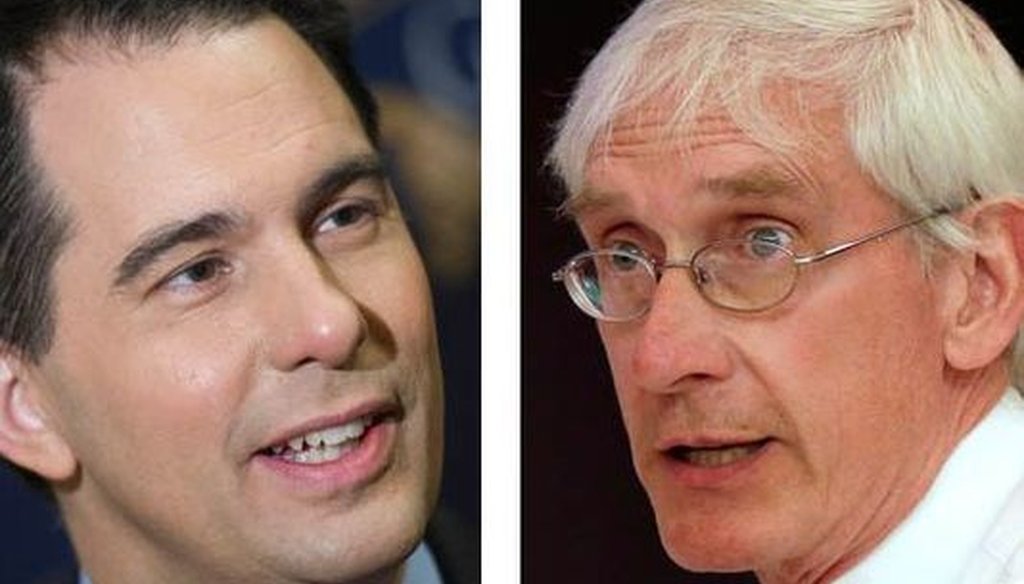Stand up for the facts!
Our only agenda is to publish the truth so you can be an informed participant in democracy.
We need your help.
I would like to contribute

Seeking a third term in the Nov. 6, 2018 election, GOP Gov. Scott Walker (left) has repeatedly attacked his Democratic rival, state schools superintendent Tony Evers, over Evers' handling of a teacher viewing pornography at school case.
If you’ve noticed any TV ads in the race for governor, chances are they’ve been about a teacher who was fired, but then rehired, after viewing pornography at school — and what state schools superintendent Tony Evers, the Democratic candidate for governor, should have done about it.
Both Republican Gov. Scott Walker and the state GOP have repeatedly run ads using the case to portray Evers as failing to protect kids.
"The reason they keep showing it has to mean they think it's working," said Mordecai Lee, a government affairs professor at the University of Wisconsin-Milwaukee and former Democratic state lawmaker. "Probably the results from focus groups and from rolling overnight snap polling. Winning an election is about whatever it takes."
The case involves a Madison-area middle-school teacher who was fired in 2010 for viewing images and videos of nudity on his school computer and sharing them with co-workers.
An arbitrator gave him his job back, in part because state law at the time required a finding that the teacher’s behavior endangered students. Two courts ruled the arbitrator had acted within her authority in deciding to turn the firing into a suspension.
We’ve done fact checks and an article on five of the TV ads (and one digital ad). They have earned ratings of either Half True or Mostly False.
In other words, there’s a lot that the ads — both those that attack Evers and those that defend him — get wrong about the case.
So, here’s a review of the key points made, and how we’ve assessed them, as we approach the Nov. 6, 2018 election.
All our fact checks in the governor’s race.
The teacher looked at pornographic material at school during the workday, via 23 emails sent by his sister, that included pornographic photos, jokes and movies. And he shared the material with male and female co-workers.
It was alleged, but not established by the arbitrator or Evers’ Department of Public Instruction, that the teacher made comments about the chest sizes of middle-school girls and the sex skills of one girl.
Evers had the option to try to revoke the license of the teacher, who could have fought the move. Walker called on Evers to do so after a circuit court and an appellate court upheld the arbitrator’s decision giving the teacher back his job and the state Supreme Court refused to consider the case. But there was little legal basis for Evers to try and revoke.
In short, like the arbitrator, Evers’ department had determined that the teacher’s behavior, done outside the presence of students, did not endanger students under state law at the time.
"Evers had the discretion to begin revoking the license before the court decisions, but elected not to, because Harris’ conduct did not meet the statutory definition of ‘immoral conduct,’" said Madison arbitration lawyer Jaya Sharma.
(The arbitrator had also determined that because some of the teacher’s co-workers had engaged in the same conduct, but only he was fired, that the firing was excessive.)
The case helped spur state lawmakers to change the law in such situations.
Like us on Facebook. Follow us on Twitter: @PolitiFactWisc.
The lack of a legal basis to revoke the teacher’s license was made clear when Walker signed a change in state law so that now a teacher can be fired for viewing pornography at school, even if students were not present.
Evers’ department supported the change, working with a GOP lawmaker on drafting it and testifying at legislative hearings in favor of it, though Evers did not personally testify. So, it goes too far to say Evers got the law changed.
Lee theorized that Walker and his allies might view their attacks in the case as an effective way to focus on Evers as a person, rather than his views on issues.
"If successful, it is a kind of horizontal attack that undermines everything about his candidacy, compared to a vertical attack limited to, say, his views on the gas tax," Lee said.
"I'm guessing that the ad is particularly aimed at women with college degrees, perhaps especially full-time homemakers," he added. "This demographic is unhappy with the GOP because of" President Donald Trump "and might vote Democratic in November. Walker needs them to vote for him and not take out on him their dissatisfaction with Trump."
Our Sources
PolitiFact Wisconsin, "Wisconsin GOP mostly misfires in attack on governor candidate Tony Evers over school porn case," Sept. 8, 2017
PolitiFact Wisconsin, "Yes, but: Explaining GOP's attack on governor candidate Tony Evers on not revoking teacher's license," Aug. 6, 2018
PolitiFact Wisconsin, "Third attack ad vs. Tony Evers in teacher porn has some of the same problems," Aug. 16, 2018
PolitiFact Wisconsin, "Hitting back, group defends Dem governor candidate Tony Evers in handling of teacher porn case," Aug. 29, 2018
PolitiFact Wisconsin, "Group defending governor candidate Tony Evers in handling of teacher porn case is partially accurate," Sept. 12, 2018
PolitiFact Wisconsin, "Scott Walker misleads in claiming Tony Evers could have revoked teacher license in porn viewing case," Sept. 13, 2018
Email, University of Wisconsin-Milwaukee government affairs professor Mordecai Lee, Sept. 15, 2018
Email, Madison arbitration lawyer Jaya Sharma, Sept. 16, 2018




















